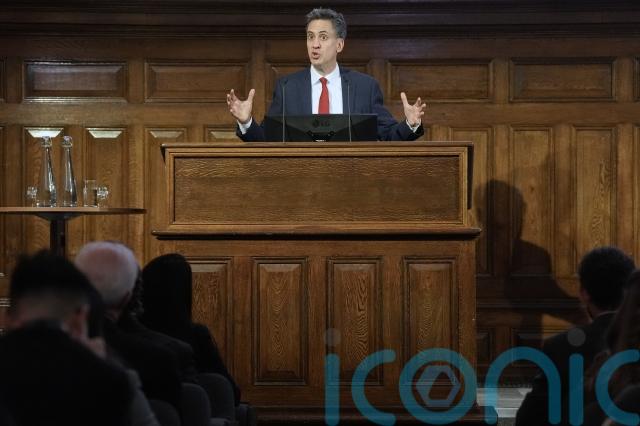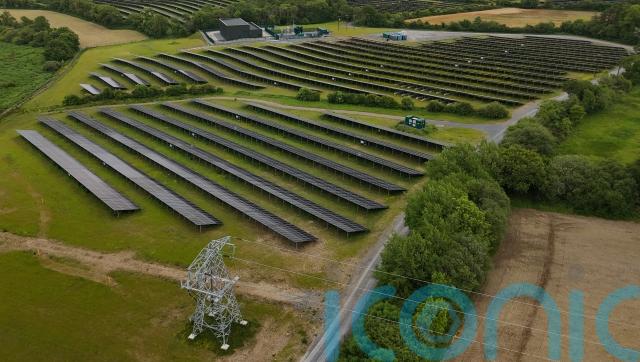
The Government has unveiled the first-ever national plan to train and recruit workers who can fill the skills gap in the clean energy transition.
The strategy, published on Sunday, outlines how the Government will deliver on its promise for more than 400,000 extra jobs in the clean energy sector by 2030, doubling the existing opportunities.
Under the plans, ministers have identified 31 priority occupations that are particularly in demand, such as plumbers, electricians and welders.
Five “technical excellence colleges” will be set up to train workers with clean energy skills, the Government said.

A new programme will also be launched to match veterans with careers in solar panel installation, wind turbine factories and nuclear power stations – as will tailored schemes for ex-offenders, school leavers and the unemployed.
Elsewhere, the plans say oil and gas workers will be able to benefit from up to £20 million from the UK and Scottish Governments for bespoke careers training in clean energy roles.
And the “energy skills passport,” which identifies routes for oil and gas workers to transition into offshore wind, will be extended to new sectors, including nuclear and the electricity grid.
Energy Secretary Ed Miliband said: “Communities have long been calling out for a new generation of good industrial jobs.
“The clean energy jobs boom can answer that call – and today we publish a landmark national plan to make it happen.
“Our plans will help create an economy in which there is no need to leave your hometown just to find a decent job.
“Thanks to this government’s commitment to clean energy, a generation of young people in our industrial heartlands can have well-paid, secure jobs, from plumbers to electricians and welders.
“This is a pro-worker, pro-jobs, pro-union agenda that will deliver the national renewal our country needs.”

In the plan, the Government will set out how trade unions will be a key part of its jobs drive by recognising their role in securing high pay and good conditions for workers.
This includes a new “fair work charter” between offshore wind developers and trade unions to ensure firms benefitting from public funding provide good wages and strong workplace rights.
Ministers said they will also look to close loopholes in legislation to extend employment protections enjoyed by offshore oil and gas workers working beyond UK territorial seas, including the national minimum wage, to the clean energy sector.
Work and Pensions Secretary Pat McFadden said: “We’re giving workers the skills needed to switch to clean energy, which is good for them, good for industry, and will drive growth across the nation.
“Our new jobs plan will unlock real opportunities and ensure everyone has access to the training and support to secure the well-paid jobs that will power our country’s future.”
It comes as part of the Government’s wider efforts to boost economic growth and decarbonise the UK’s electricity grid by the end of the decade.
Ministers say their decision to greenlight the Sizewell C nuclear power station in Suffolk will support 10,000 jobs at peak construction, while it announced Rolls-Royce as the preferred bidder for the small modular reactor programme to support up to 3,000 jobs.
Elsewhere, the Acorn and Viking carbon capture and storage projects (CCUS) in development in Scotland and the North East will support a combined 35,000 jobs, the Government estimates, building on the 4,000 jobs already set to be created in other CCUS projects in the North West and Teesside.
Christina McAnea, general secretary of Unison, said: “This plan can help create a UK workforce with highly skilled, fairly paid and secure jobs.
“Extra investment for retraining will mean experienced staff already employed in the sector are able to take on new roles.
“Additional funding for apprenticeships and opportunities for young people are crucial too if the UK is to have a bright and clean energy future.”
Sue Ferns, Prospect senior deputy general secretary, said: “If this mission is to be a success, and support the wider industrial strategy and growth agendas, then we urgently need a step-change in the level of workforce development.
“In this context, is it welcome that this Jobs Plan now exists and the new initiatives are a welcome step in the right direction.
“However, the scale of the challenge of training new workers and supporting existing workers, including those looking to transition from other roles, requires both more resource and co-ordinated effort across government.”

Dhara Vyas, chief executive of Energy UK, said: “Today’s announcement is a critical step forward in building the workforce required to deliver our future energy system.
“It rightly recognises the need to tackle the skills challenge collectively by investing in both new talent and our existing workforce.”
Jane Cooper, deputy chief executive at Renewable UK, said: “This long-awaited plan delivers on employers’ calls for a coherent Government workforce strategy for clean energy and we look forward to working with Ministers to realise its ambitions.”
Subscribe or register today to discover more from DonegalLive.ie
Buy the e-paper of the Donegal Democrat, Donegal People's Press, Donegal Post and Inish Times here for instant access to Donegal's premier news titles.
Keep up with the latest news from Donegal with our daily newsletter featuring the most important stories of the day delivered to your inbox every evening at 5pm.